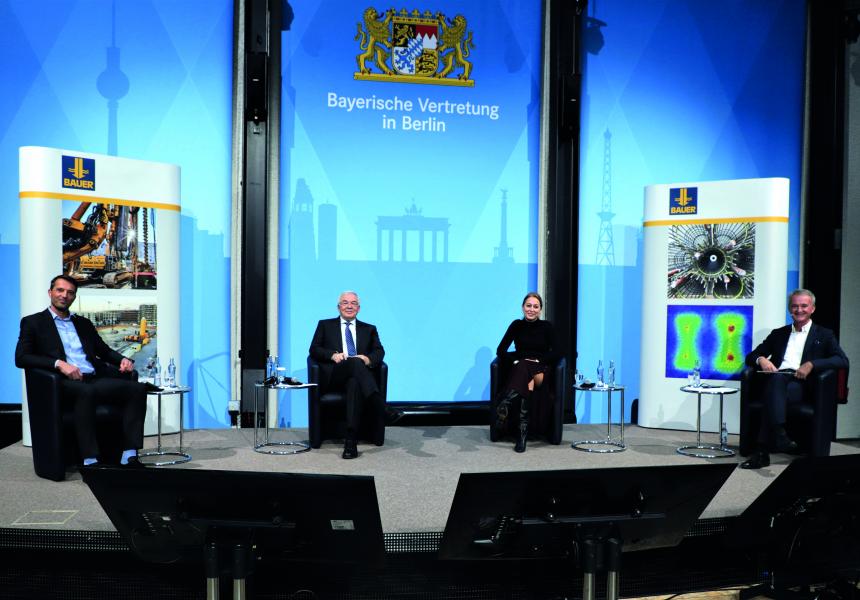Unusual times call for unusual means of communication: given the current restrictions, Bauer Spezialtiefbau held its first interactive webinar with live stream on November 12, and it was a resounding success.
The online event “Sustainable concepts are needed in construction – Setting new benchmarks for specialist foundation engineering” was broadcast from the State of Bavaria Berlin office with an average of around 700 viewers accessing from their screens. Hans-Joachim Bliss, Managing Director of Bauer Spezialtiefbau, acted as moderator for the event. Renowned guests from the construction sector contributed to the panel discussion: Dr. Christine Lemaitre, Chief Executive Officer of the German Sustainable Building Council, Prof. Dr. Lamia Messari-Becker, Professor of Building Technology and Construction Physics at the University of Siegen and member of the Club of Rome, who connected virtually, as well as Prof. Thomas Bauer, President of the European Construction Industry Federation (FIEC).

The event kicked off with a keynote speech by Dr. Karsten Beckhaus, Head of the Structural Engineering Department at Bauer Spezialtiefbau. His presentation touched on topics such as the sustainability goals of AGENDA 2030 released by the United Nations, the requirements for sustainable specialist foundation engineering methods and the enormous potential for the development of sustainable technologies in specialist foundation engineering:
“It is already possible to reduce the CO2 equivalent by 30% using sustainable methods. We have to make use of these beneficial alternatives,” remarked Dr. Beckhaus.
This was followed by a statement from Prof. Dr. Lamia Messari-Becker, in which she addressed the central relevance of the construction industry to the german government’s environmental and climate protection goals and emphasized the crucial role that resource-efficient, regenerative construction will play in the future.
“We need more cooperation, more dialog and more communication about sustainability in the construction industry,” remarked Dr. Messari-Becker.
“Sustainable construction must be understood as a political field of action; it must be included in political agendas and be made appealing to all parties involved. Innovation, performance and competition – these cornerstones of the social market economy are also especially fundamental for climate protection,” says the internationally experienced construction engineer.
The first thematic section was concluded with various surveys, in which all webinar participants were given an opportunity to contribute to the discussion using an app. Specific audience questions were discussed, for example contract awarding practices and the possibility of giving more weight to environmental aspects in that context.
Prof. Thomas Bauer’s statement focused on how to realistically and enthusiastically master the challenge of sustainability in specialist foundation engineering:
“We need to approach the challenge of sustainable construction at the right speed and with the right technologies, and we must not let a failure to act prevent us from taking responsibility. The political world has been fueling the shift towards sustainable development for some years now, and the public is also starting to think about sustainability in the long term – I think it would be a major step for companies to take on the leadership role in this area.”
As a follow-up to Prof. Bauer’s statement, more audience questions were answered that touched on topics such as sustainability in construction equipment, the impact of digitalization on emissions reduction in specialist foundation engineering and how to make the significance of the construction sector more understood in society.
Dr. Christine Lemaitre then discussed the importance of more equally integrating the environment, people and the economy into the concept of sustainability:
“It is not necessary to pretend that this process is a science. Instead, what matters is to define and adhere to substantiated benchmarks.”
Certification systems could be an important and appropriate tool to establish equal footing for all parties involved in construction.
“Ultimately, what’s most important is to do the right thing. We are already able to build sustainable and to ensure quality – no one is preventing us from doing more than what is required,” remarked the Chief Executive Officer of the German Sustainable Building Council.

The final round of questions to the panel focused on the alternative energy generation through geothermal heat in specialist foundation engineering as well as the possibility of establishing incentives for sustainable construction, even among private investors. After the final polls were evaluated and discussed,
Hans-Joachim Bliss summed it up:“When it comes to sustainability in construction, quality is not negotiable. There is no lack of innovative ideas, but politics and business need to work together.”
A mutual consensus among the guest speakers was evident by the end: Many of the necessary technologies and methods already exist – it is just a matter of actively using them in order to bring about a permanent transition to sustainable construction.
Source:Bauer Maschinen Group


 Copyright 2017-2025 All rights reserved.
Copyright 2017-2025 All rights reserved.